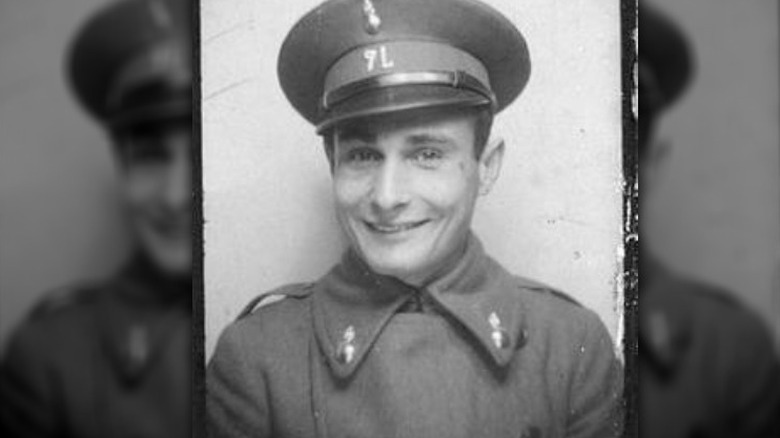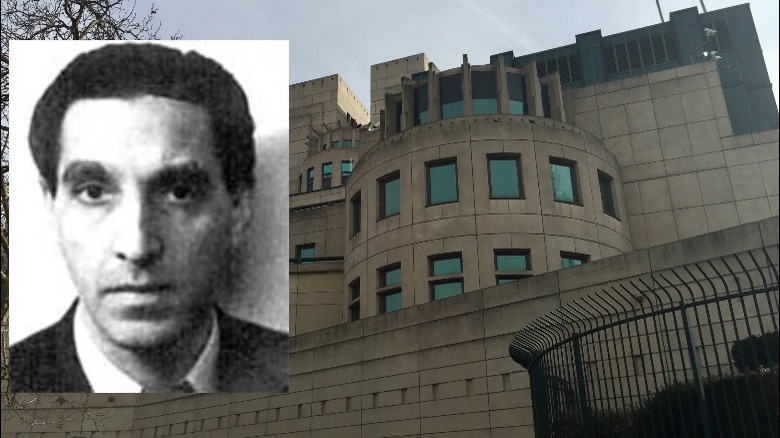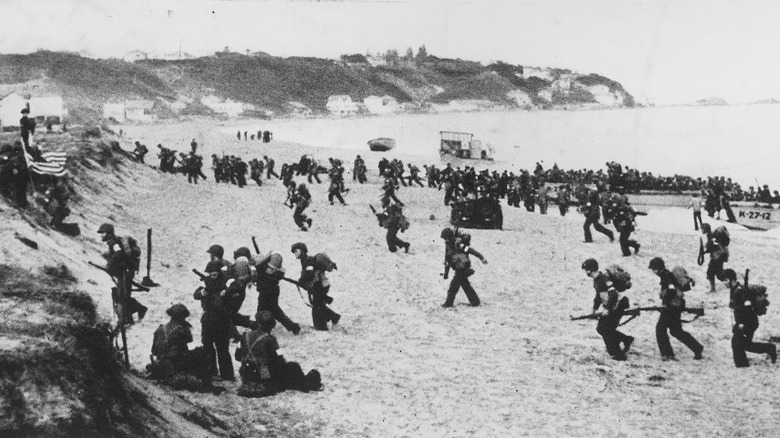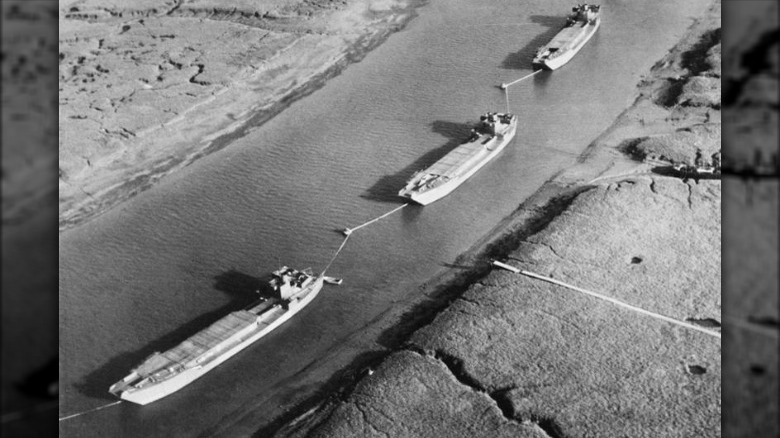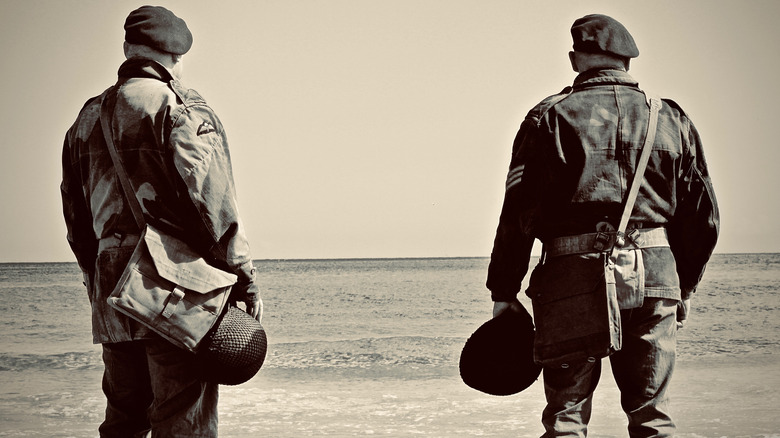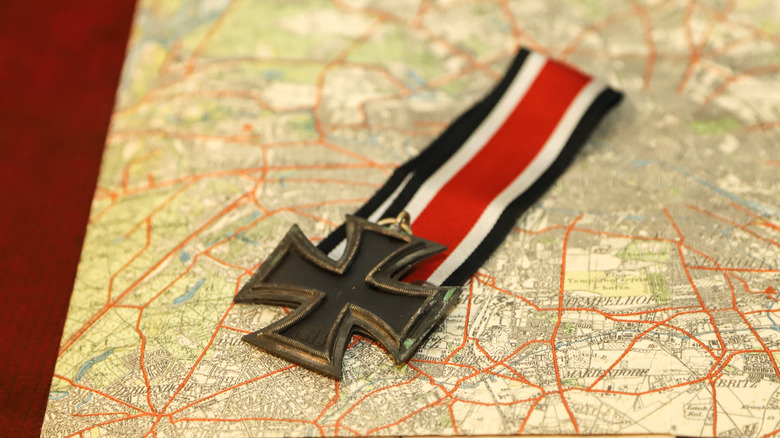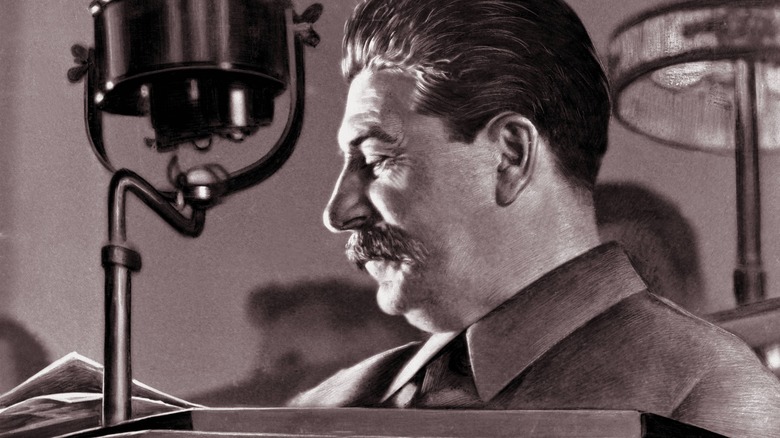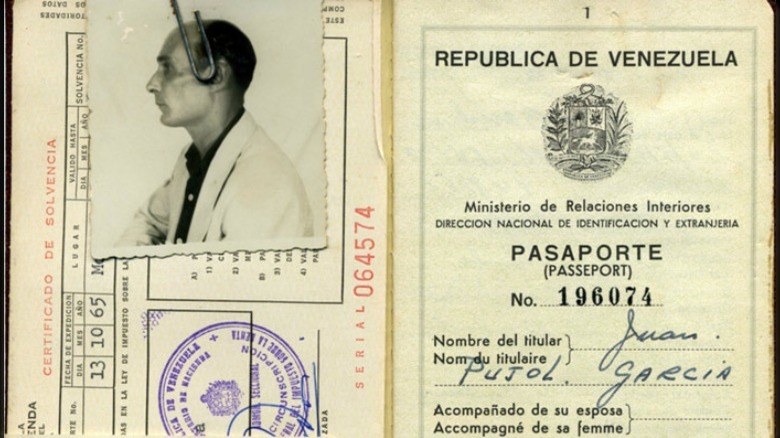The Self-Made Spy That Helped Win D-Day
The thing about World War II is that it's filled with a lot of really horrible stuff. That's at the heart of it, after all: In a nutshell, it was terrible people not allowing other, different people to, you know, be their own people.
While the war brought out the absolute worst humanity had to offer, it also brought out the best in others, who were willing to go to extremes in order to oppose forces that they knew just had to be stopped. There are scores of stories about men and women who made the ultimate sacrifice so the world was safer for those they'd never even met, and that's incredible stuff.
Not all heroes picked up weapons and headed out to the front lines — some risked their lives in other ways. Spies and secret agents played a massive part in the war on both sides, and some of their stories are so strange they make James Bond look like an amateur. Take Juan Pujol Garcia, a Barcelona native who was the spy that the British didn't know they needed. At first, they didn't even want to deal with him, turning him away when he offered to do a little intelligence-gathering and misinformation-spreading. Fortunately for the world, he didn't take "No" for an answer, and ended up saving D-Day.
The British didn't want him as a spy, so he became one anyway
When it comes time to describe people who are unlikely to be great spies, a chicken farmer from Barcelona has to be at the top of the list. But that's what Juan Pujol Garcia was. Well, before he decided to become a spy and save the world. Born in 1912, he lived through the Spanish Civil War — during which time he fought for both sides, but claimed he had never fired a gun. By the end, he'd acquired a healthy hatred for totalitarian regimes, so when the Nazi war machine started marching across Europe, what's a chicken farmer to do? He wrote (via Legion Magazine): "I wanted to start a personal war with Hitler. And I wanted to fight with my imagination."
It's an odd proposal to say the least, and MI5 says that yes, Pujol reached out to the British government with offers to become an Allied spy three times — and each time, he was firmly told to go away. So, he reached out to German intelligence agents stationed in Madrid, and made the same offer.
They didn't say no, and instead, they gave him some trial-by-fire training in espionage basics, and sent him on his way with some very specific instructions. He was to head to England, settle there, and recruit others to the cause. What he actually did was sort of his own interpretation of those orders.
He did all his spying for the Germans... from Portugal
So, at this point, Juan Pujol Garcia was supposed to be living in Britain and spying for the Germans, but Stephan Talty — historian and author of "Agent Garbo: The Brilliant, Eccentric Secret Agent Who Tricked Hitler and Saved D-Day" — says (via NPR) there were a few major obstacles in his way. Not only did he have no way to get to London, but he had never actually been there. Also? He didn't speak English. That was absolutely all right, because he knew that if he actually went there and started sending messages to the Germans, he risked being executed before he could turn double agent.
This, says British military history expert Mark Simner (via WWII Nation), is when he headed to Lisbon instead. He set himself up with piles of reference materials, including tourism guidebooks, magazines from his local library, newspapers, and a handful of reference books (via MI5). And then, he started writing and sending his reports off to his German handler in Madrid. (That was an intelligence officer named Friedrich Knappe-Ratey, or Frederico.)
It wasn't just the Germans who bought it, hook, line, and sinker — the Brits started to panic a bit, too. When they got wind of what was going on, they were completely convinced that they had a mole somewhere in the inner workings of their wartime planning. They didn't — it was just a guy with a guidebook.
His wife played a major role, too
Secrecy was, of course, of the utmost importance, and it was only in 2016 that The National Archives released a slew of files on Juan Pujol Garcia and his work with British intelligence. Among the files were some details on just how he managed to pull the whole thing off, and he did it with help from his wife, Araceli.
It was Araceli who hand-delivered his made-up messages to German intelligence, explaining how they got to Portugal from "London," and securing the German agency's belief in the whole charade. As far as the Germans were concerned, they had the agent code-named "Arabel" firmly entrenched in British life (via Legion Magazine).
It was Araceli, too, who ended up being the one to successfully reach out and make contact with an Allied representative who actually believed in the insane story of what Pujol was doing. That man was Edward Rousseau, and he was in Lisbon as the American Assistant Naval Attaché. His support kicked off a chain of events that ultimately led to the Brits taking a second look at Pujol, and realizing just how valuable an asset he would be.
He 'assembled' a team of 27 'agents'
Juan Pujol Garcia was finally moved to England in early 1942, when he was assigned to work with an intelligence agent named Tomas Harris (pictured). Official documents (via MI5) laud it as "one of those rare partnerships between two exceptionally gifted men whose inventive genius inspired and complemented each other." Pujol was given the code name "Garbo," because of his skill at assuming a slew of different personalities. Over the next two years, he and Harris wrote around 315 letters and a total of around 630,000 words to German intelligence, and for a bit of perspective, "Moby Dick" clocks in at just over 206,000 words (via The Best American Poetry).
They also created the vast network of spies that the German government had tasked Arabel with assembling once he was on British soil, and yes, each one of the 27 spies had their own stories, occupations, and specialties. The Spectator says that they invented "Rags, the Indian poet," "the Widow" and "the Mistress," and "Fred the Gibraltarian." There was also a US Army sergeant on the list, and they even created a fictional order of Welsh fascists that were supposedly based in Swansea and called the Brothers of the Aryan World Order (via WWII Nation).
The sheer volume of correspondence and widespread network of spies was so impressive that according to Legion Magazine, the Germans thought they had that area of intelligence so well covered that they just sort of stopped recruiting.
Gaining the trust of the Germans
Operation Torch, says the United States Holocaust Museum, was — in a nutshell — the invasion of Morocco and Algeria by American and British forces. It ran from November 8, 1942, to the 16, and it was a massive undertaking that involved more than 100,000 troops. It was also the way that Agent Arabel put the finishing touches on his airtight reputation with Axis intelligence: He sent them the plans for the invasion ahead of time. Sort of.
The National WWII Museum says that the whole thing went off with some help from MI6. Plans were literally just sort of popped into the mail, and while they arrived in German hands after Operation Torch kicked off and the invasion took place, MI6 made sure they were post-marked with a date way in advance.
The Germans lauded Arabel's info — which supposedly came through one of the members of his spy ring, a Glasgow dock worker. They wrote (via Legion Magazine) that the "last reports were magnificent." They never questioned when they had actually been sent, and it looked to them that they had not only a loyal spy, but one with access to some seriously impressive intel that was now proven to be accurate beyond the shadow of a doubt.
Laying the groundwork for Operation Fortitude
There was a lot of planning that went into the events of D-Day, and that included Operation Fortitude. That, says English Heritage, was basically a bit of smoke-and-mirrors. The goal was to convince Axis powers that the invasion was going to be happening not in Normandy, but in Pas-de-Calais. If they could do that, the result would be much less resistance for the 100,000+ troops that were actually going to be storming the beaches of Normandy. It was wildly ambitious, and even involved building a fake fleet from wood, canvas and scaffolding. One of the most important pieces to the whole thing, though, was Juan Pujol Garcia.
Pujol/Garbo/Arabel was a key part of the Double-Cross system, which involved a group of double agents under the observational umbrella of the XX (Twenty) Committee. British military historian Mark Simner says (via WWII Nation) it was one of the most audacious and — more importantly — successful espionage missions in history, and thanks to Pujol, it changed the course of the war.
And his role started months in advance of the planned June date for D-Day. In January, he started sending messages warning the Germans that the Allies were planning an attack on Pas-de-Calais. Some days saw him sending more than 20 messages, and they were impossible to ignore.
Carrying off the deception that saved D-Day
British military historian Mark Simner says (via WWII Nation) that Pujol's success came because he was feeding them information that was slightly correct, carefully chosen to be delivered in a way that reinforced his loyalty, and arrived too late to allow the Germans time to act and react. In the days leading up to D-Day, the powers-that-be leading the Double-Cross team decided to have their star spy tell his German contacts that there was going to be an invasion force sent to Normandy... but it was a ruse.
The evening of the landing, Pujol had a pretty stunning chance to increase his clout with the Germans even more. When he hopped on the radio to send his message about the landing, no one replied — and Pujol doubled down. He accused the operators at the other end of neglecting their duty, and then, he threatened to quit. Clearly, he was absolutely legit and he meant business.
After the invasion, it came to light just how important his messages had been. Around 60 of them had been included in briefs that were escalated to the highest of German command, and yes, the ongoing messages worked: 21 divisions of the German military were held at Pas-de-Calais — even after D-Day began — in preparation for the main Allied invasion force that had arrived elsewhere.
His wife nearly ruined the whole thing
Juan Pujol Garcia's wife, Araceli, may have been instrumental in setting him up with both the Germans and the British, but according to documents released by The National Archives in 2016, she nearly ruined the whole thing. Once the couple was relocated to England, it wasn't long before she spiraled into homesickness, loneliness, and despair. MI5 forbade her from speaking to anyone in the Spanish-speaking community, and even as her husband's handler, Tomas Harris, called her "highly emotional and neurotic," keeping her happy turned into a full-time job. The documents also revealed (via the Independent) that an MI5 agent named CP Harvey was even sent on a mission deemed "top secret" — to requisition her 12 pairs of stockings. It was described as "a small matter of some importance."
Harris' fears that something was going to go wrong nearly came to fruition when she threatened to go to the Spanish embassy and spill the beans on the entire thing.
Pujol and Harris had to take extreme measures, arranging to fake his arrest — then telling her it was because of the security risk she'd posed. After getting word that he'd been detained by MI5, she called one of her husband's contacts, who stopped by her house to find her threatening suicide. Convinced she was "play acting," they kept up the charade until they had her complete assurances that she wouldn't threaten to jeopardize Agent Garbo and his work again.
He was awarded high honors from Germany... after D-Day
The Iron Cross is a German medal of honor that goes back to 1813, and according to Britannica, things changed a little bit during World War II. Adolf Hitler not only expanded the degrees of Iron Cross that could be awarded, but turned it into an honor awarded for "exceptional bravery and/or leadership in the face of the enemy." One of the recipients was Juan Pujol Garcia, and shockingly, The Spectator says that his award came on July 20, 1944. And yes — that is weeks after he fed those very same Germans all the false information about the plans for the D-Day landing. That medal also came with $350,000 in cash, so that's definitely not too shabby.
Jason Webster, historian and author of "The Spy with 29 Names: The Story of the Second World War's Most Audacious Double Agent," has an interesting theory about this. He suggests that Pujol's German handler knew that he was a double agent, but that things had gone so far that admitting he'd been duped would go very, very badly for him. So, he simply told Hitler that everything's fine, there's nothing to see here ... and Pujol got his award.
Later, he'd also get an MBE from the British, and WWII Nation says that makes him the only spy to get high honors from both the Allied and the Axis powers.
Britain had more plans for him
In hindsight, it's a little weird that the U.S., Britain, and the Soviet Union were all on the same side during WWII, but it's that whole, "enemy of my enemy is my friend," thing. According to The National WWII Museum, the U.S. was never entirely comfortable with the prospect of Stalin being in power, and according to documents released by The National Archives (via the Independent), the British had plans to turn their most successful double agent loose on the Soviets.
The plan was outlined by Agent Garbo's handler, Tomas Harris — and the idea was pretty elaborate. Pujol was going to be told to reach out to the Soviets with a complaint: He believed, he would claim, that an Allied victory would mean the end of Spain's dictator. When it became more and more clear that wasn't going to happen, he was going to claim to switch sides to someone who could help free his beloved Spain. He would, of course, still be working for MI5.
Still, there was a huge "but." Tomas Harris himself had some questions raised about his loyalties, and there were whispers that he was a Soviet spy himself. He'd gotten his job with MI5 thanks to Anthony Blunt, who did ultimately confess to being firmly on the side of the Soviets. The plan never came to fruition, and Harris died in a mysterious car accident in 1964.
Then he just disappeared
So, what happened to Juan Pujol Garcia after Agent Garbo was retired? His story doesn't get any less bizarre. For a few years after the end of the war, History says that Pujol continued to keep his ear to the ground for any whispers of a Fourth Reich. MI5 adds that there was a worry that he was going to be exposed for the double agent that he was, and it wasn't long before he understandably wanted to get far, far away from Europe, the war, and what had to have been an unbelievable amount of stress and pressure.
So, he talked to his MI5 handler, told him to spread the rumor he'd died of malaria, then took off for Venezuela. Among those who were informed of his death? His wife and children.
Once in Venezuela, the Independent says he lived a pretty quiet life that involved running a little store and occasionally teaching Spanish. It wasn't until the 1980s that a British writer named Nigel West started looking for him, and found him. Figuring he was probably safe enough at that point he came forward, confirmed the whole wild story, agreed to tell his tale for a memoir, and reunited with Araceli and their children. He passed away in 1988... for real this time.

